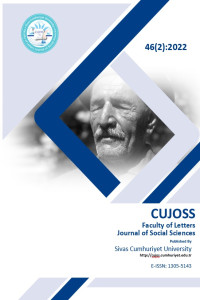Abstract
Çağdaş İngiliz yazar Angela Carter, The Passion of New Eve adlı eserinde ataerkil kadınlık mitlerini, hermafrodit miti ve yaratılış miti dâhil olmak üzere, eleştirel bir yaklaşımla tekrar yazarak yeni bir söylem yaratmıştır. Bu çalışma cinsiyet kategorilerini bozmak adına girişimde bulunan Angela Carter’ın kadın, anne, erkek arketiplerini yıkmaktaki motivasyonunu gösterir. Carter’ın bu eseri cinsiyet belirsizliğinin ve cinsel kimliğin akışkanlığının mitik materyallerin yeniden gözden geçirilmesiyle tekrar yapılandırıldığını gösterir ve bu yapılandırma okuyucuların zihninde toplumsal cinsiyet algısı dinamiklerinin sorgulanmasına ve cinsiyet kategorileri üzerine tekrar düşünülmesine olanak sağlamıştır. Sonrasında, bu çalışma 20. Yüzyıl kadın yazarı Angela Carter’ı ataerkil toplum düzenindeki kalıp yargıların dışındaki cinsiyet tanımlamalarını ve uzantılarını yansıtan alternatif bir söylem üretmeye yönelten unsurların neler olduğu sorusuna cevap vermeye çalışmıştır. Ataerkil düzenin yarattığı cinsiyet kalıp yargıların eleştirisini gözler önüne seren Carter’ın argümanı biyolojik cinsiyet algısının ontolojik bir yanılsama olduğu, cinsiyetin tekrar eden ve öğrenilmiş edimlerle kurulduğu üzerinedir. Böylelikle, bu çalışma kadın ve erkek cinsiyetleri arasındaki sürekli devam eden akışkanlık, oluşum ve belirsizliği, cinsiyet farklılıklarının aşılmasındaki bir yol olarak öne çıkarmaktadır.
References
- Butler, J. (1993). Bodies that matter: On the discursive limits of sex. New York: Routledge.
- Butler, J. (1996). Imitation and gender insubordination. D. Morton (Ed), In the Material Queer (pp. 180-192). Boulder, CO: Westview Press.
- Butler, J. (2004). Undoing Gender. New York: Routledge.
- Carter, A. (1992). Introduction. Expletives Deleted: Selected Writings. London: Vintage.
- Carter, A. (1980). The Sadeian Woman. New York: Harpercollins.
- Carter, A. (1982). The Passion of New Eve. London: Virago.
- Carter, A. (1997). Notes from the front line. J. Uglow (Ed), In Shaking a Leg: Journalism and Writings (pp. 38-69). London: Chatto & Windus.
- Carter, A. (1990). The Virago Book of Fairy Tales. London: Virago.
- Friedman, E. G. & Fuchs, M. (1989). Breaking the sequence: Women’s Experimental Fiction. Princeton, NJ: Princeton OP.
- Halberstam, J. (1991). Automating gender: Postmodern feminism in the age of the intelligent machine. Feminist Studies, 17(3), 439-460. https://doi.org/10.2307/3178281
- Cixous, H. & Clement, C. (1991). The newly born woman (B. Wing, Trans.). Minneapolis: University of Minnesota Press. (Original work published 1986).
- Stone, S. (1991). The Empire Strikes Back: A Posttranssexual Manifesto. K. Straub & J. Epstein (Eds), In Body Guards: The Cultural Politics of Sexual Ambiguity (pp. 280-304), New York: Routledge.
Abstract
The contemporary British author Angela Carter in The Passion of New Eve (1977) creates a discourse that exposes, critically revises and rewrites patriarchal myths of femininity including the Christian myth of origin, the myth of hermaphrodite. More specifically, this study shows Carter’s impetus to demythologize the false “universals” of archetype of motherhood, womanhood and manhood in an attempt to unsettle categorical polarizations of feminine and masculine. Carter’s The Passion of New Eve illustrates the way gender ambiguity and sexual fluidity is constructed by the revision of the mythical material, which allows the reader to question gender dynamics and reconsider the categories of sex and sexuality with variation in mind. Then, this study will briefly give the answer for the following question: what stimulates this twentieth century women novelist to construct an alternative discourse, reflecting upon non-normative identification and its implications in the mainstream society. Her critique of reality created by the “social fictions” of patriarchal order formulates the argument that gender is not a biologically determined essence, but an illusion, a repeated and learned imitation of heterosexual ideal regulated by gender performance. Accordingly, this study foregrounds continual fluidity, becoming and ambiguity between genders as a way of dismantling sexual and gender polarization.
References
- Butler, J. (1993). Bodies that matter: On the discursive limits of sex. New York: Routledge.
- Butler, J. (1996). Imitation and gender insubordination. D. Morton (Ed), In the Material Queer (pp. 180-192). Boulder, CO: Westview Press.
- Butler, J. (2004). Undoing Gender. New York: Routledge.
- Carter, A. (1992). Introduction. Expletives Deleted: Selected Writings. London: Vintage.
- Carter, A. (1980). The Sadeian Woman. New York: Harpercollins.
- Carter, A. (1982). The Passion of New Eve. London: Virago.
- Carter, A. (1997). Notes from the front line. J. Uglow (Ed), In Shaking a Leg: Journalism and Writings (pp. 38-69). London: Chatto & Windus.
- Carter, A. (1990). The Virago Book of Fairy Tales. London: Virago.
- Friedman, E. G. & Fuchs, M. (1989). Breaking the sequence: Women’s Experimental Fiction. Princeton, NJ: Princeton OP.
- Halberstam, J. (1991). Automating gender: Postmodern feminism in the age of the intelligent machine. Feminist Studies, 17(3), 439-460. https://doi.org/10.2307/3178281
- Cixous, H. & Clement, C. (1991). The newly born woman (B. Wing, Trans.). Minneapolis: University of Minnesota Press. (Original work published 1986).
- Stone, S. (1991). The Empire Strikes Back: A Posttranssexual Manifesto. K. Straub & J. Epstein (Eds), In Body Guards: The Cultural Politics of Sexual Ambiguity (pp. 280-304), New York: Routledge.
Details
| Primary Language | English |
|---|---|
| Journal Section | Articles |
| Authors | |
| Publication Date | December 30, 2022 |
| Published in Issue | Year 2022 Volume: 46 Issue: 2 |
.

